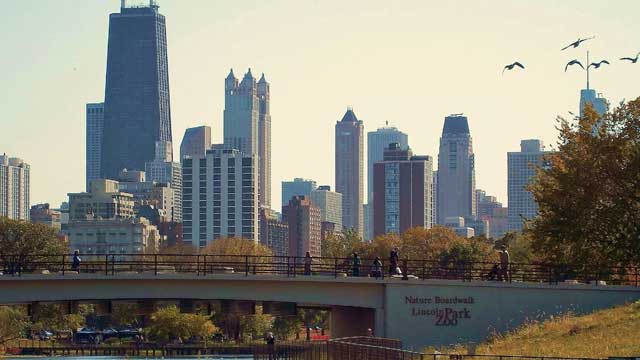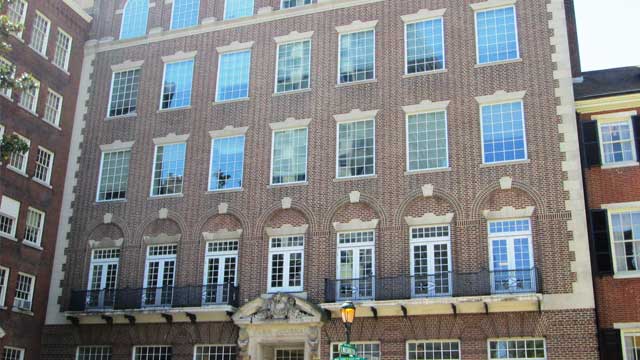The Future of Apartment Showings Using 3D and VR Experiences With Brian Frisby
In this episode we talk with Brian Frisby who is running multifamily for Matterport, a 3D and VR company specializing in developing the street view for inside buildings.
Transcript with Timestamp
Dan Daugherty: 00:03 Welcome to another episode of rentbits rental talk. I am your host Dan Daugherty and today our guest is Brian Frisby who is running the multifamily division for Matterport. Brian thank you for joining us.
Brian Frisby: 00:17 Thanks for having me
Dan Daugherty: 00:19 Can you give us a brief introduction on what Matterport does maybe a brief history for our listeners as well.
Brian Frisby: 00:27 Absolutely. So many awards been around for about five years in the market and we've developed a technology both hardware and software that captures spaces in three dimensions. So we have a camera that comes into a space and it's the same time that it's capturing the 2D imagery., i's also measuring the space. So we've got this kind of patented dollhouse view that you can look down on on a space and get a real sense of you know the lay out how things are related to each other and also obviously dive in and be fully immersive as if you're as if you're there at the home or the apartment for rent.
Dan Daugherty: 01:12 It's funny. This is a maybe 4 years ago. We were one of ten companies, remotely.com was one of 10 companies that was pitching the real AIG executives on the East Coast and that airport was actually there and I knew right then and there from the technology that I was seeing it was a really cool tripod that did a whole 3D interactive demo and I knew they were going to win and of course Matterport won. I don't know what it was maybe was ten or fifty thousand dollars or something like that. But I think that was a catalyst for Matterport raising significant amount of money. How much money have you guys raised so far?
Brian Frisby: 01:57 Oh it's it's 50 plus million. We're in a series we're already past a series C.
Dan Daugherty: 02:04 Series C. And now I think it was originally for real estate agents. Redfin I think did it an exclusive deal with you guys were on their properties. If I am I am I correct.
Brian Frisby: 02:18 Redfin us a large partner of ours. And so initially the focus was on the residential real estate and but we've definitely evolved since then you know in the past it was you bought the camera the software plan and you either did it yourself or you hired somebody to do it now specifically in multifamily large new owners and managers can contact us and have us do it for them. So we bring in our own equipment and our professionals and we get them captured without any investment on the our side.
Dan Daugherty: 02:52 Oh I see that. That's a nice extra service. So so for those people listeners that are familiar with Google Street View where virtually anywhere in the world you can go to a location and see your surroundings and move around as if you're physically there. That's how I relate to Matterport. Your technology is so advanced that you can literally do a quote unquote street view within any apartment or home as if you were physically there. I believe apartments.com ss with you guys as well as some of the other rental sites. Have you seen is an increase in lead to conversion with your technology or any other data points that you can tell us?
Brian Frisby: 03:38 Yeah absolutely. So costar obviously the owner of apartments.com and several other rental sites they're reporting 250 to 300 percent increase in time on listing. So that means that renters are spending a significant amount of a larger amount of time you know exploring those those units in those communities. And therefore they're also is sending 49 percent more leads. So again that tells me that that ranter by viewing a 3-D tour of a unit or a clubhouse or fitness room is qualifying that that community in gathering information albeit visually. But they're gathering information and that's making them much more qualified. And they're feeling more comfortable in picking up the phone or sending an e-mail because they've seen that which is obviously evidenced by the 49% increase in leads.
Dan Daugherty: 04:32 Huge growth. In addition to the 3-D, you also are incorporating augmented reality into the user experience. For example if someone's walking into an apartment, virtually they can see various augmented reality pop ups so they can go over maybe and see that the granite countertops are made locally or whatever it might be to add additional information during the tour as if a leasing agent was actually walking them through it, is that correct?
Brian Frisby: 05:07 Absolutely. They are called Matertags. So they are little beacons within the tour that allow you know the apartment community to call out certain things that might not be readily apparent. You know I always say you know don't don't put a button on there that says granite countertops because they can see that but they might have a smart thermostat or a built in Bluetooth speakers or maybe they just replace the windows and they've got really great energy savings there or even just commonly asked questions. We all know that renters you know all the information is typically on a Web site but are renters actually reading it. So there's commonly asked questions like hey what are the room dimensions. Those are great things to call out. So by the time they take that tour they're pretty qualified. They've had most of their answers or questions answered and they're ready to go. Maybe they just need to stop by and make sure that what they saw is actually there.
Dan Daugherty: 06:00 So that's obviously a lot better than historically where we had classified sites and had just websites and newspapers and so forth. And we're making that progression towards really physically being there but not physically being there. Do you see the technology changing dramatically in the next five to 10 years with new technology entering the market like Magic Leap where they are making glasses a lot more virtual and I'm seeing some other technology in the space where you can actually feel and touch certain types of textures. Do you see that changing in the future for remote showings?
Brian Frisby: 06:47 Well I certainly think that with 3-D technology and all the other things like virtual reality, augmented reality and specifically like augmented reality when you think about it is you're in a physical space but you can augment it. So imagine a time where you're at an apartment community and they're showing you a vacant unit. Now all of a sudden you can take furniture places maybe on an iPad. You're pointing that iPad's camera at the living room and you can Drag in you know a couch or maybe you're in a maybe you're in a 3-D model on your computer and you scanned your furniture with your phone and now you can actually play your furniture in that 3D model. So imagine that like you can take your actual furniture. So I do see technology moving that way. I think there's a couple things that will drive 3-D technology in the next five to 10 years. One being more devices, so that would be you know not only the matter for camera but other cameras as well including mobile phones. And I think you know adoption's going to be necessary just like photos are today like you can never imagine an apartment community putting up a listing with you know limited photos let alone no photos. And that was the case 15 years ago. Most of the listing sites he maybe had five 10 15 photos. Now you know you've got photos of everything. It's got to be you know in five years it'll easily be that you have to have an immersive 3-D experience of the space that you're either trying to rent out or sell you know down the line.
Dan Daugherty: 08:23 Will you also be or can you do this today where you know with Rentbits data that we're showing 10 to 15 percent of all leads are being generated outside of the state. And a lot of people are moving or are migrating from state to state for new jobs so forth. And many times sight unseen and they don't know the neighborhood or anything like that. Do you also have the ability to show the potential tenant the neighborhood where you can literally walk outside of the community maybe walk down a block or is that something that could be done in the future?
Brian Frisby: 08:58 No we do. So there's a little bit of a limitation on our hardware that we're using infrared and so sunlight and infrared don't play well together. Well sunlight has infrared so it's the infrared kind of interfering with each other. But what we can do is we can scan a 360 photo essentially a 360 panel of the exterior and give them a sense of what the street looks like and attach it to say maybe the leasing office tour or the clubhouse tour. And we do that all the time now for outdoor amenities. So yeah you can get a true sense of you know if it's a home for sale you can scan the front yard the Backyard and then obviously if you're in the front yard you're looking down the street. You get a sense of you know nice of a neighborhood is a tree lined street. So on and so forth actually we just scanned the apartment community in Nashville and they said they had a phenomenal park across the street. So we went out and scam you know 10 15 different viewpoints so that they could see the place and the tennis courts and there's a couple of really cool restaurants next door so yeah we can certainly give sense of the neighborhood.
Dan Daugherty: 10:05 Let's quickly go back to what you were mentioning about the furniture because that's kind of interesting. We're seeing a lot more technology entering this space with Houzz and some others where it's so realistic that you actually feel like the furniture is there and it's sized exactly to the dimensions of the unit. I didn't really think about that too much but there is huge opportunity where you can have a turkey solution for the renter. Maybe they are moving. And they don't want to ship all of their furniture. Maybe they want to sell their furniture in California and they are moving to Colorado. Then they could use your platform to not only see what different types of furniture looks like but if you had a deal with say I don't know how your Amazon or some of these other retailers. You can literally move into your place already furnished based upon what you actually selected during checkout. Right?
Brian Frisby: 11:05 Yeah absolutely. So today we have a partnership with Roomi. Spelled with three 0's. And so for apartment communities the common adoption for Matterport with an apartment community or management companies they will have us come out and they'll do the model unit and the amenities maybe a you know vacant or two if it's available. But over time they're finding that they want to have a tour of every unique floor plan. So you might have 15 or 24 plans you're going to have them all scanned but they're all vacant. And obviously you know staging those physically is cost prohibitive. So we do have the ability to virtually stage any vacant space today. And then you have the natural progression of that is it would you like to see furniture from you know Crate and Barrel. You know you know Restoration Hardware. Maybe it's you know Target depending on the type of property is right and so you know depending on who the renter is you're going to be able to get furniture select it. That goes for buying an antique furniture. So yeah there's absolutely there's definitely a scramble not only of not only retailers and rental companies to digitize their inventory in a 3-D format so that they can you know meet that need or that application in the future.
Speaker 4: 12:24 Are you now that you're focusing specifically on multifamily are you seeing even more of these apartments or some of the units within these luxury apartments turning into hotels or apartels. You know you have companies like pillow who are taking advantage of the entire short term Airbnb type stuff you have. You have companies like that are that are renting units. And then then short term renting them right as apartels I think is the terminology. Are you working with any of current multifamily real estate investment trusts or management firms that are also using technology to make their short term rentals better than just the photos you're
Brian Frisby: 13:12 not specifically. Although I am talking with a company and I can't name them but they are. They are actually building essentially Airbnb communities so that you know hundred percent of a 150 unit building is actually you know and Airbnb so to speak. There's a lot of times today it's against the communities where the management company's policy to have individual renter use it as an AirBnB and so there's a little bit as you know trying to figure out how to utilize it. But certainly and we've done some pilots with AirBnB and the results have been phenomenal. So yeah no I think short term rentals we've got a few corporate housing companies that are using our technology. Actuall, national corporate housing which I think is out of Denver. So yeah no short term rentals is certainly an application. Is there really any any space that you're trying to sell or rent out is this a perfect application for this technology.
Dan Daugherty: 14:14 Do some of these multi use buildings that are that are you know maybe a restaurant downstairs and units upstairs and that they're using your technology within the units are they also are using it for the club houses or the restaurant downstairs or you know that the common areas?
Brian Frisby: 14:33 Oh absolutely. I know we we typically like I said earlier we're going in and capturing clubhouse fitness room you know the pool area everything that really that makes them stand out all the amenities and then certainly the units that get you know a significant amount of interest.
Dan Daugherty: 14:51 So what's your current pricing. How does it work. Say I'm a management company or an owner of a 100 unit building in Denver. And I want all 100 vacant units done and eventually all units done, how does that work, is that a monthly fee?
Brian Frisby: 15:08 So there's two pieces there's an initial set up so to bring you into our systems as well as go and capture a ballpark talking about about a hundred dollars per space assuming that there's a minimum number so you know if we go out and take one tour it's going to cost more in a per tour basis and you go out to five or ten tours you've got to pay for the travel time and set up and got all that. So our standard package for an apartment community is 500 dollar set up and that allows them up to five tours. And then there's an ongoing 35 dollar a month hosting and software fee. And what that gets them is not just a 3-D tour but there is the ability to add Mattertags which we talked about so you can customize your tour with the matter tags you can embed video audio files image files within those matter tags. And then there's also 2D and 360 photography. So within our platform called workshop you can go in and curated photos from that same photos you and these photos are for support quality. It allows you to use on your Web site or even print up to 8 1/2 by 11. You can hold on to the four players if you want so a black and white floor plan. Again we're measuring that space. You have access to virtual reality solver tours or are converted to VR. And then lastly you can publish to Google Street View. So where your business listing. So if you've been on the Google business asking whether that's for business or an apartment community and you've seen the 360 degree you know panels that you can navigate through. We we're now publish in to that. So it's a it's a pretty robust media platform that you're buying it's not just that 3-D tour right.
Dan Daugherty: 16:55 Right. So you guys negotiate a deal with Google for the Google local business to make their local listing on Google even more robust right?
Brian Frisby: 17:05 Right so in the past somebody had to go out and hire a Google Street View photographer to go capture that who had access to the platform and that you know for most apartment communities that would be anywhere from 12 to 15 hundred dollars. So now today you get your matterport and its done. There's a you know there's a simple polished process within our platform. And so yeah we're opened up that Google actually opened up there. The street view platform to multiple players including matter for about a year and a half ago and so we've been working with them to integrate. And so that it's as simple as a few clicks. Now your tours are published on your street listing. Now it's not I'd like to say sexy or is as clean as the 3D tours the matterport produces. There's a little bit of drag in the transition and you don't have that 3-D Dollhouse view but it's a great it's a great immersive experience where they know they can walk through a clubhouse or a model.
Dan Daugherty: 18:03 That's fantastic. Now how many multifamily units in the US are currently using using the technology?
Brian Frisby: 18:14 I would probably say we have roughly 10 percent of the addressable market. When I say addressable market today it's you know it's it's a and b properties. Probably most C properties or affordable properties aren't going to have a budget or maybe not want to utilize 3-D. So I would say when I look at apartments on Zillow. You know you think there's probably 30 to 35 thousand communities that you know that spends money, a reasonable money amount of money on marketing and so I'd say we probably have about 10 percent of those
Dan Daugherty: 18:54 and that's just in the U.S. are you guys also expanding internationally.
Brian Frisby: 18:57 So there were definitely international I'm know 100 percent focused on the multifamily space in the U.S.. Unfortunately we don't track. We don't track the industry or space type on every space that's captured. So it's something that we're working towards but we should have better data a year or two.
Dan Daugherty: 19:17 That would be interesting too. Because you know the density as you know the density from you know building 2 to renters is like 90 plus percent in Europe and 95 percent of all of the people that are living in those areas are actually renting as compared to buying so obviously a much larger opportunity. But to your point is there is a cost advantage of staying in the U.S. for now and then as technology gets cheaper then start expanding out to other other countries.
Brian Frisby: 19:49 You know I think that that's that that's the keys of today. You know while I think it's relatively inexpensive I mean if you think about it you know. So let's say you know an average space is going to cost let's say a 2000 square foot home is going to cost maybe 200 to 250 dollars to capture. That is still a little bit expensive and if you're in if you're a you know if you're an apartment management company and you want to do it yourself you've got to buy the hardware which you know that investment is you know four plus thousand dollars so there's a barrier I think as we talked about earlier if you know when new devices can be brought into our ecosystem like mobile phones or even other cameras. That's going to drive adoption significantly because today you know the label that has a 500 dollar per month unit or the real estate agent that selling 150000 dollar home probably isn't going to spend the money on a matterport. But if I can just go in with a mobile phone and scan it and upload it to the metaphor cloud and have it processed and now I've got a 3-D tour that's a whole other game. So yeah I think the growth is going to be exponential in the next five years as as the cost either the cost of hardware our hardware comes down and it has maybe just released a camera or last year for 3,895 and now it's already down to 3395 and some you know obviously the more we sell we can get our costs down. So and then eventually I think with mobile we're using mobile devices or sensors or even machine learning which is something that we're heavily involved in not to go down to too much of a technical point but I do think that you know those are going to be key drivers to mass adoption.
Dan Daugherty: 21:36 Yeah the costs will just keep dropping with any and all technology does spread. Warwick Moore's Law. That's not going toover be interesting next 10 years as well as see the quality will increase and the cost will drop and mass adoption will be probably in the hands of everyone even even the lower cost stuff that you were talking about with you know $150,000 home or a hundred dollar a month unit. Ideally I think every single space in the world should be able to be just like Street View.
Brian Frisby: 22:07 Absolute I believe it will because if you have everybody with a phone in their hand I mean we may not get to some of the you know some of the third world places but you know anybody with a phone in their hand that can scan a space and upload it to you know to a to a central database and we'll be mapping the entire world. Specifically though to renter kind of going circling back to renters you know imagine today what the renter does. They go online they go to a series of Internet listing sites they narrowed on their search but they still have to visit them right the 2d imagery just isn't enough. But even when they get there they go see the amenities they see a model you know they might see a couple of vacants but most of the time they don't see the actual unit the actual unit they are going to live in. And in some cases they don't even see the same floorplan because it's just not a. I mean today the occupancies are so great that you know you walk in and you see the actual unit type that you're going to live in. So the ideal renter experience long term would be you can actually see the unit that you're going to live it. And that removes kind of that little bit of mistrust like am I really going to live in an apartment that looks like this. And so we've actually had one of the large trees reach office and say what would it cost to capture every single unit in our apartment building. I was like wow that's pretty. That's bolf.. If it's you know 350 units or whatever it is they had 70 plus thousand units across the country. And the reality was that on the surface it was five million bucks. Well that's a lot of money. But when we looked at what they're losing in rent to having a model unit it was about four point eight million. So they could take the money that they're losing by not renting out those models rent those out and use that to invest in 3-D tours for every unit in the building and even do some virtual staging. You know you might take the 20 unique floor plans and stage them. Now you've got a stage virtual unit for every unit type in your village.
Dan Daugherty: 24:08 So that makes perfect sense. I'm actually looking at potentially buying a new car and I was on Carvana. And what you're saying makes so much sense. Each car is unique. When more Carvana that's the actual car I'm going to buy It should be the same for renters who are in a unit that's the actual unit that I'm going to rent.
Brian Frisby: 24:32 Yeah I want to see my my furniture my appliances I want to see my view I want to walk out on the balcony and see you know that I'm looking out at the you know the pool or maybe I'm looking out in the parking lot but I want to know what is you know my unit is
New Speaker: 24:46 well this is this is great. Lots of knowledge. You guys have a great technology and a great service. Thank you for sharing it with us. We're out of time but I appreciate your time.
New Speaker: 24:56 Thank you for having me.












